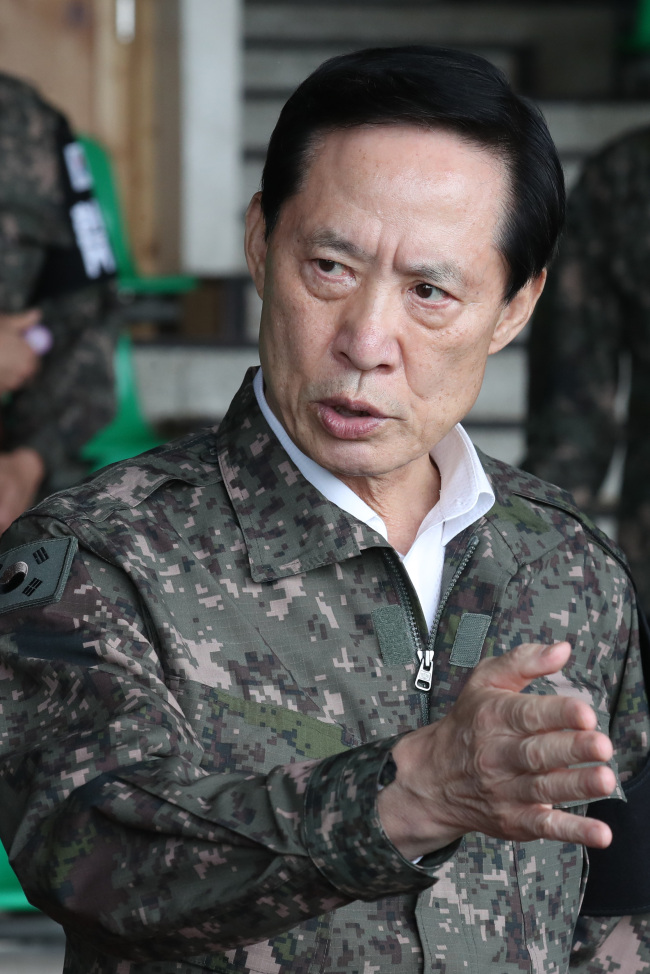Defense Ministry seeks to overhaul cyber and security commands
By Sohn Ji-youngPublished : July 23, 2017 - 16:17
South Korea’s Ministry of National Defense plans to overhaul the cyber and security commands that have been under criticism for excessive oversight on civilian and military affairs during past conservative governments, military officials said Sunday.
Led by new defense chief Song Young-moo, the overhaul measure would aim to prevent Cyber Command from interfering with domestic politics and Defense Security Command from surveilling innocent civilians and military officers.
“The move would include measures that prevent security and cyber commands from engaging in activities that might provoke political controversy,” said a military source, who declined to be identified due to the sensitivity of the issue.
The ministry is considering abolishing the Security Command’s branch devoted to monitoring high-profile officers for subversion and disloyalty, the official said. The branch was established to prevent a military coup during the authoritarian 1970s, but criticism has emerged that the system has been outdated since the country achieved democratization in 1987.

Regarding Cyber Command, the ministry is seeking to reorganize the command’s scandal-ridden Defense Psychological Operational Group, which was mired in controversy in 2012 for the allegation its personnel posted online comments in favor of the then-ruling party’s presidential candidate Park Geun-hye, who defeated Moon Jae-in at the polls.
Some of the group’s cyber-related elements would be incorporated into the Defense Intelligence Agency under the Defense Ministry, which provides intelligence assistance, integration and coordination across military services, the source said
“In order to prevent Cyber Command from getting involved with domestic politics, we will rebuild the organization of the psychological operational group and reposition personnel inside the unit,” the source added.
These measures are a series of reforms led by Defense Minister Song, who has stressed the need for a military overhaul by streamlining its force structure, revamping its leadership and enhancing interoperability among all military branches.
As a part of the efforts, Song is expected to appoint Security Command’s next chief from among the Air Force, Navy and Marine Corps generals -- not from the Army, which has dominated the position since its creation amid the Korean War in 1950.
Designed to monitor military and civilian activities that might jeopardize national security, the command consists of three major branches. Beside the one in charge of inspecting military officers, the other two oversee counterintelligence operations against North Korea and defense espionage.
But the command came under fire for illegally surveilling civilians, particular democratic activists, during the authoritarian governments led by former military generals such as Chun Doo-hwan, who himself served as a security commander before staging a coup in 1979.
The command’s authority was brought under control after South Korea elected activist-turned-politician Kim Young-sam as president in 1993. But the controversy reemerged in 2009 when the command was found to engage in civilian inspections during the past Lee Myung-bak administration.
By Yeo Jun-suk (junsukyeo@heraldcorp.com)












![[Today’s K-pop] BTS pop-up event to come to Seoul](http://res.heraldm.com/phpwas/restmb_idxmake.php?idx=644&simg=/content/image/2024/04/17/20240417050734_0.jpg&u=)




![[KH Explains] Hyundai's full hybrid edge to pay off amid slow transition to pure EVs](http://res.heraldm.com/phpwas/restmb_idxmake.php?idx=652&simg=/content/image/2024/04/18/20240418050645_0.jpg&u=20240419100350)

![[Today’s K-pop] Zico drops snippet of collaboration with Jennie](http://res.heraldm.com/phpwas/restmb_idxmake.php?idx=642&simg=/content/image/2024/04/18/20240418050702_0.jpg&u=)